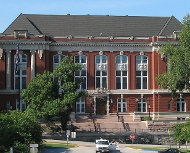4/30/2014
Missouri Supreme Court Rejects Red Light Camera Industry AppealCourt decisions finding red light camera use illegal are upheld by Missouri Supreme Court.

Missouri's highest court on Tuesday rejected the desperate pleas of municipalities to rescue the legally troubled red light camera industry. Photo ticketing giant American Traffic Solutions (ATS) and the cities of Arnold and Ellisville pleaded with the justices to overturn a series of appellate decisions that found the use of automated ticketing machines in the state to be illegal. The justices refused to do so.
"These significant decisions are now final," attorney Ryan A. Keane told TheNewspaper. "Although there is still work left to be done, there is light at the end of the tunnel. This could mark the beginning of the end for cameras in Missouri."
Keane was the lawyer who succeeded in convincing the state Court of Appeals to issue a stunning retraction of its 2011 decision endorsing the use of red light cameras. In that prior ruling, appellate Judge Robert G. Dowd Jr -- cousin of registered ATS lobbyist Edward L. Dowd Jr -- came up with the creative argument that red light cameras do not issue tickets for moving violations. Instead, they mail out civil penalties for vehicles that are essentially "illegally parked" in an intersection when the light is red.
In last year's Edwards v. Ellisville decision, which today became the law of the land in the Show Me State, the full Eastern District Court of Appeals, acting en banc, concluded that Judge Dowd's legal conceit was "no longer good law."
As a result, the camera ordinances were found to conflict with state law because they converted a moving violation into a parking ticket, failing to impose license points as state law requires for all moving violations. In Brunner v. Arnold, also upheld today, the court went on to conclude that municipalities have deprived vehicle owners of their constitutional due process rights by creating a "rebuttable presumption" that they were guilty of operating the vehicle at the time it was photographed.
In February, the high court allowed three other cases that rejected red light cameras to stand as final. These include Damon v. Kansas City (view decision), Unverferth v. Florissant (view decision) and Ballard v. Creve Coeur (view decision).
In light of these decisions, Missouri red light cameras will not be able to continue to function as they do at present. If cameras are to be used at all, cities would have to report violations to the state so that points could be issued against the license of the actual driver, not just the vehicle's owner. Identifying the driver requires taking photographs of both the front and rear of the vehicle, as is done in Arizona and California. Such ticketing requires new camera equipment, and photographs that do not clearly show the driver's face must be thrown out. Because this would cut significantly into the current revenue models, new contracts and city ordinances would be required.
Given the difficulty of restructuring existing systems, the camera industry has put its hopes on passage of House Bill 1557, a "reform" bill that would nullify the appellate rulings and allow ticketing to continue without license points.


